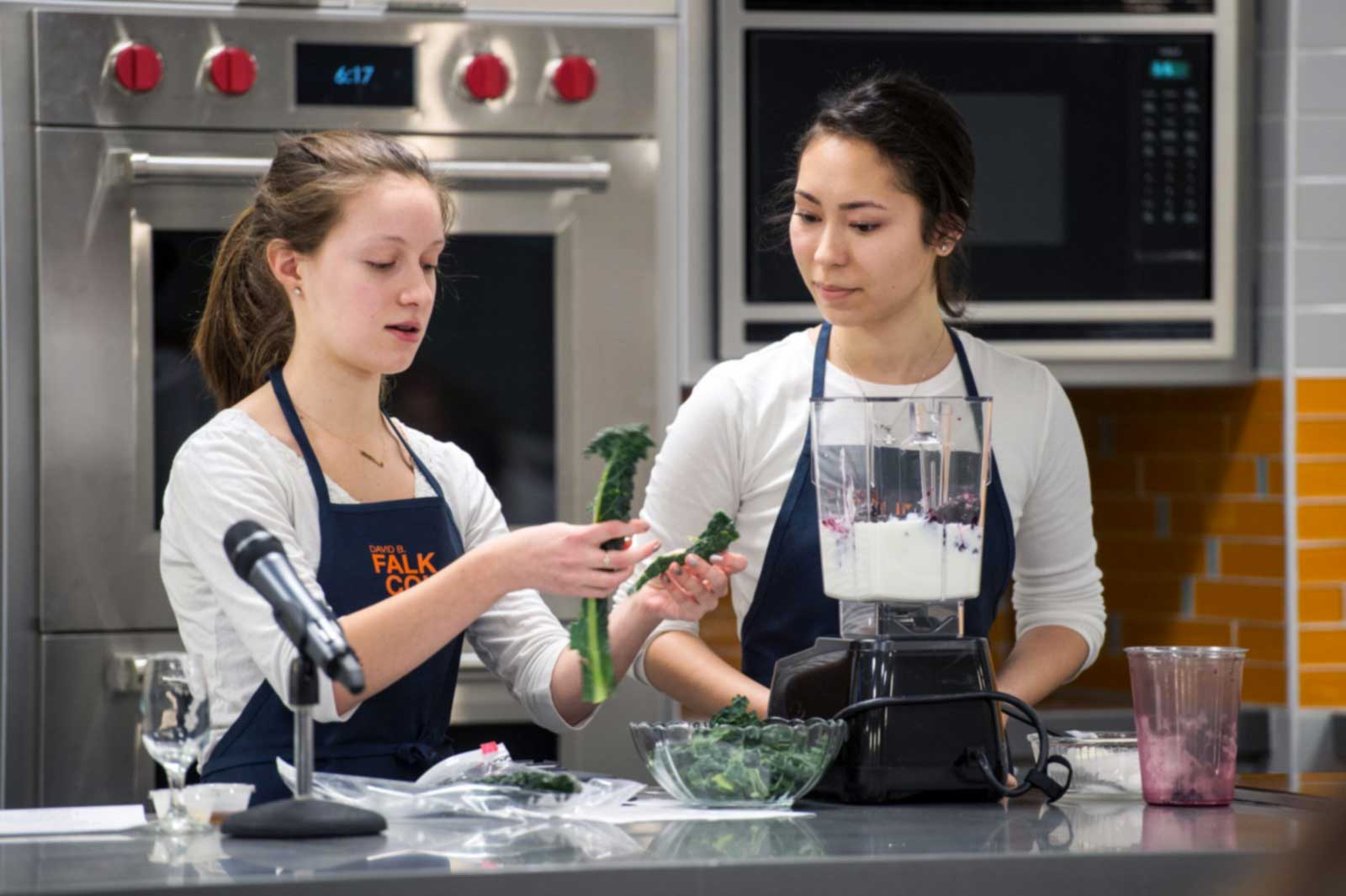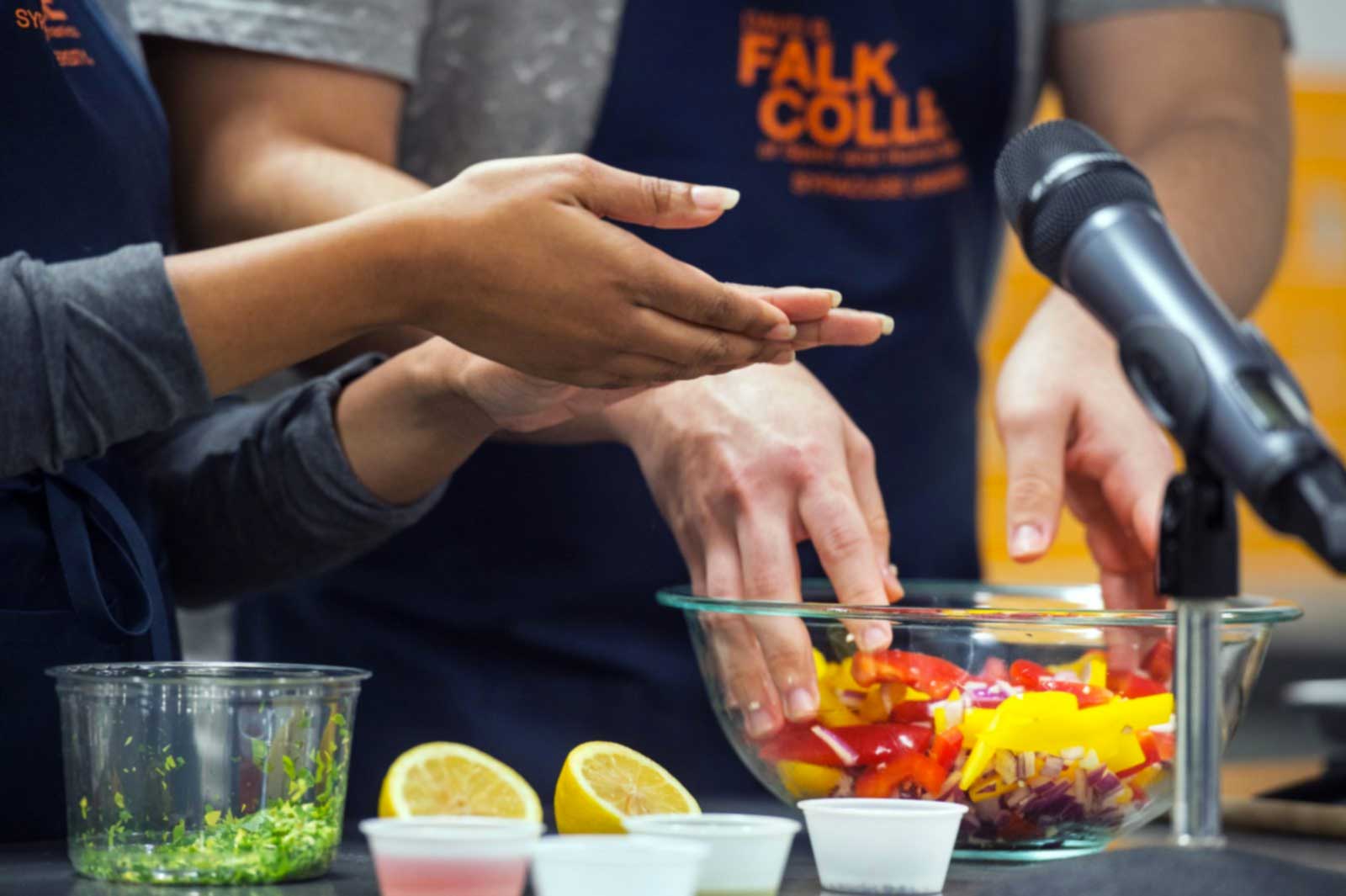
This fall, more than a dozen recent graduates of Syracuse University’s nutrition dietetics program start work in postgraduate internship placements at prestigious hospitals and health care organizations across the U.S. From the beginning of their first year in the program, these students engaged in experiential learning and mentoring to qualify for competitive internships in their areas of interest. In 2020, each and every one of them was admitted to an internship of their choice.
The program’s 100% match rate this year compares to a national average of just 56%, highlighting its commitment to helping students achieve career goals. Based in Falk College, the nutrition dietetics program is a pathway for students who plan to become registered dietitian nutritionists.
The 1,200-hour guided postgraduate internship is required before students can sit for the Commission on Dietetic Registration exam to qualify as a registered professional. Candidates must complete a supervised Accreditation Council for Education in Nutrition and Dietetics (ACEND)-approved program at a health care facility, community agency or food service organization. In addition to an area of concentration or focus, each dietetic internship provides rotations in the three primary areas: clinical, food service and community.
Applications for dietetic internships are processed through a centralized match program, a computer-based method that aligns the preferences of applicants with those of program directors. Internship applications are due in February of senior year, but at Syracuse, students begin preparing on day one. The nutrition dietetics curriculum makes them eligible for practice programs, but ultimately, it’s what students choose to learn and do along the way that helps them stand out among fierce competition.

The Ultimate Testing Ground
“We tell students they should have completed at least 250 hours of related experience in all three areas by the time they apply for a postgraduate internship,” says program director Nancy Rindfuss. The more related experience—community service, part-time work, research with faculty members, study abroad, minors, leadership programs, honors coursework—the more sharply students can hone their fit for precisely the right match.
Syracuse University offers an incredible array of opportunities to do just that. For example, the Syracuse Abroad course Mediterranean Food and Culture: A Florence Experience takes students right to a source of this renowned cuisine to address the theory and concept of the diet and study models for sustainable food production in Italy. Through the Mary Ann Shaw Center for Public and Community Service, students can find volunteer or part-time work opportunities with local senior centers, food banks and other nonprofit organizations that address the importance of nutrition to health and well-being. Students also have the chance to participate in faculty research, and professional dietitians in the local community often seek students to “shadow” and assist them in clinical, research or private practice settings.
“Students are immersed in mentoring, advising and experiential learning because the last thing we want is for a student to think they want to go into a certain area of focus or field and then find out it’s not actually the right fit,” says Kay Stearns Bruening, director of Falk’s Nutrition Assessment, Consultation and Education Center and a program reviewer for ACEND. “The Syracuse program ensures they have an excellent testing ground.”
Aspiring Clinician Forges Her Own Path
After traversing this ground as an undergraduate student, Madeline Peck ’20 came full circle this summer working as a barista at a familiar café before starting an internship at New York Presbyterian Hospital in September. “I worked at this café a long time ago, when I was first getting interested in nutrition. It’s nice to be back, with so much new perspective,” Peck says. This experience—like numerous others she accumulated as a nutrition student at Syracuse—helped build the foundation for the career she has designed, and practiced, along the way.

Peck’s resume reads like a handbook for cocurricular involvement. Freshman year, she was a volunteer for Meals on Wheels and participated in the competitive Orange Seeds leadership development program, followed by a summer internship with a food pantry in her hometown of Beverly, Massachusetts. As a sophomore, Peck garnered a spot as a teaching assistant for introductory courses in nutrition and culinary arts, where she tried out teaching and learned to appreciate the creativity of food preparation before landing a summer internship at Boston Children’s Hospital—her first foray into a clinical setting. During her junior year, Peck conducted independent study research at Ophelia’s Place, a support and education center in Syracuse for people struggling with eating disorders. She wrapped up her senior year as a shadow to a registered dietitian/nutritionist at SUNY Upstate University Medical Center and conducted a body image survey of Panhellenic women on campus. “My understanding of what I wanted to do changed greatly the more I learned and the more experiences I gained,” says Peck.
For internship applicants, this understanding culminates in a resume and portfolio, which they produce during a senior seminar led by Rindfuss. As part of their preparation, students practice their interviewing skills one-on-one with Falk career services staff. The personal statement portion of the application demonstrates students’ understanding and firsthand knowledge of their intended area of focus. To determine which internship opportunities align best with their interests and goals, students attend open houses and communicate with program directors. Applicants can be matched to just one program, and they usually apply to seven to 10. “It’s a tough application process, but the really hard part is choosing where to apply,” says Rindfuss.
Taking something from each of her experiences, Peck identified the primary characteristics she wanted to pursue. “I ended up knowing I wanted a clinical focus, and I wanted to be at a hospital that would challenge me, and also offer some autonomy,” she says. Peck is thrilled with her match to New York Presbyterian because she has always wanted to live in the Big Apple. During her 50-week assignment, she will complete rotations at the main campus of New York Presbyterian and at affiliated community health centers. She is doing a concentration in nutrition therapy, with the majority of rotations focusing on inpatient medical nutrition therapy.
“The Syracuse program itself prepared me well,” says Peck, noting that undergraduate research opportunities “around every corner” and a required course in nutritional biochemistry (rather than organic chemistry) help distinguish the program from others. “With all the experiences I was able to take advantage of,” Peck says, “I feel truly and fully prepared to work in the field.”
~ Betsey A. Brairton
Adapted from an SU story published on September 10, 2020.
